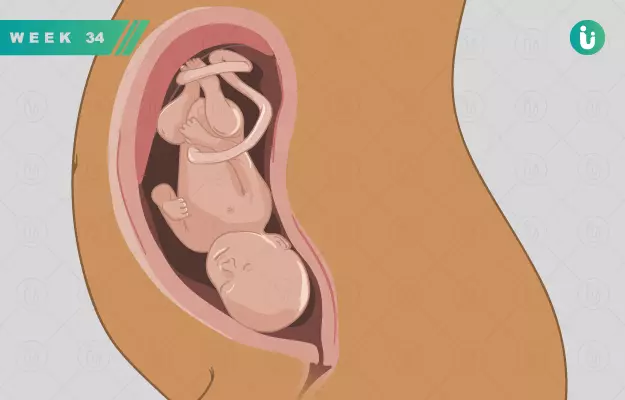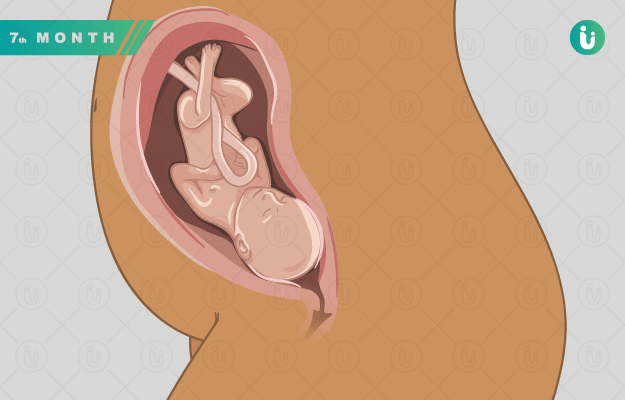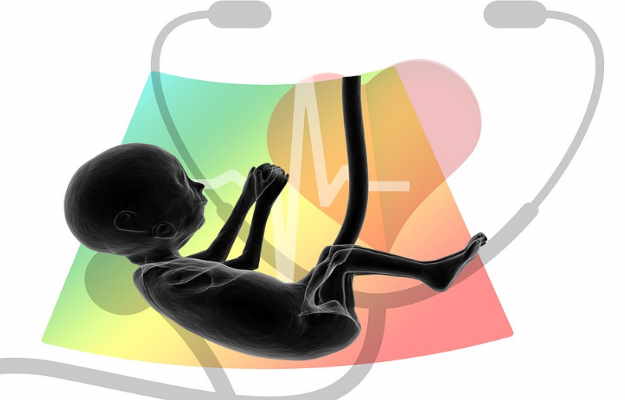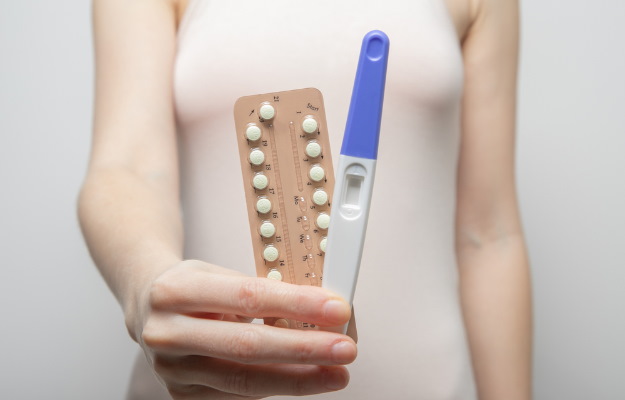Welcome to the 34th week of your pregnancy! You must be excited and anxious at the same time that full term is just seven weeks away. Preparations for you and your newborn baby must be in full swing at your home by now. If not, this is a great time to get some essentials sorted.
- You need to be well aware of your delivery details, the kind of delivery the doctor has planned for you and where you are going to deliver the baby.
- Baby-proofing your home is an essential step. Both you and your partner should make sure that you have baby-proofed your home to welcome your newborn with all safety measures in place.
- If you have older children, involve them in babyproofing the house and explain what to expect.
- Your third-trimester foetal ultrasound should happen around now. This ultrasound will help your doctor see the position of the baby and learn about any anomalies beforehand (read more: Breech position and breech birth). So, call your doctor to make an appointment if you haven't checked this off your list already. (Read more: Pregnancy ultrasound and pregnancy check-ups)
This is a major week in the final stretch of your pregnancy and it is imperative that you listen to and adhere to everything your doctor tells you. Your job or work should take a back seat for the moment and this pregnancy should top your priority list. Do not forget to put your feet up while you rest! Make sure you are eating well and following the dietary recommendations that have been advised to you by your doctor or your dietician.
The goal of this article is to help you understand the development of your baby in the 34th week and the changes that you can expect in your own body in the upcoming week.
- Baby development in the 34th week of pregnancy
- Changes in your body in week 34 of pregnancy
- Pregnancy symptoms in the 34th week
- Complications in the 34th week of pregnancy
- Things you should do in the 34th week of pregnancy
Baby development in the 34th week of pregnancy
It is important to note that between the 34th week of pregnancy and the 37th week of pregnancy, major refinements of your baby’s body will take place and he or she should gain weight drastically.
Your baby must be weighing around 2.5 kilograms at the start of the 34th week. The length of your baby from top to toe would be 44-45 cms (about the size of a loaf of bread).
The following changes may take place in your baby’s body this week:
- The vernix—a white and waxy layer that covers and protects the baby's skin—will thicken in the 34th week
- Lanugo—soft hair that insulates the skin of the baby—would have almost disappeared by now
- Your baby's fingernails will reach the tips of his or her fingers this week
- Your baby should gain around 250 grams this week
In the 34th week of your pregnancy, your baby’s brain would be developing quickly, making strong connections between the cells of the nervous system (neurons). His or her sleep cycle would be in accordance with your own!
Changes in your body in week 34 of pregnancy
You might be able to observe some changes in your body this week, as the baby might move lower into the pelvic area of your body. The following changes can take place this week:
- Lightening: To prepare for birth, your baby could move into your pelvis this week. Lightening can happen a few weeks before the birth of your baby (especially if you’re pregnant for the first time) or it could even happen on the day that you go into labour. You might observe that your belly is in a lower position and tilted to the front. The process of lightening might lead to some positive changes such as relief from various pregnancy symptoms such as breathing discomfort and heartburn but it can cause some unwanted effects such as increased pressure on your pelvic region and urinary bladder.
- Engagement: After the baby has descended into your pelvic area, the baby is in position for birth which is termed as engagement.
- Increased urination or leaking of urine: You would already be used to the frequent urination during pregnancy, now a small amount of urinary incontinence could also occur due to increased pressure on your urinary bladder as a result of the lightening. This is normal and you should not worry about it.
Pregnancy symptoms in the 34th week
The third trimester is considered to be the most difficult out of all the trimesters of pregnancy, as pregnant females can experience a wide range of symptoms and conditions. The 34th week is no exception to this. Some of the symptoms and issues you may face this week are:
- Braxton-Hicks contractions: Labour contractions can be quite intense. Braxton-Hicks contractions—basically false labour contractions—are your body's way to prepare you for them. Braxton-Hicks contractions are less intense and reduce after some time or when you change your position. Make a note of the number and intensity of these contractions as they take place—if the contractions don't reduce in intensity and if they seem rhythmic (like they are following a set pattern you can time and predict the next contraction), phone your doctor to check if you should go in for a check-up.
- Difficulty in balancing your body: Your increased mass can make it difficult for you to balance your body. It is recommended that you wear shoes with flat soles and use support while climbing up the stairs and using the washroom.
- Headaches: Dehydration can lead to severe headaches during this week. It is important to drink around three litres of water every day to avoid experiencing headaches during pregnancy.
- Sleep problems: You might experience some pregnancy-related sleep issues this week along with vivid dreams. When you experience a vivid dream, drink a glass of water and try going back to sleep. Talk to your husband, partner or other family members if you need some emotional support to deal with this problem
- Mood swings: The intensity and frequency of your pregnancy mood swings can increase this week. It is absolutely normal and you do not have to worry about this.
- Sciatic nerve pain: The sciatic nerve pain—pain down the lower back and the back of your hips and legs—occurs due to the compression of the sciatic nerve. The pain could be continuous or occur in episodes. In the 34th week, if the baby has descended into your pelvic region, there might be some sort of relief in this pain sensation. If not, you should use a hot compress on the tender area and put your feet up while you rest to resolve this pain. Your doctor might prescribe some basic pain medication to relieve this symptom. Though paracetamol is generally considered safe, do not take any pain medication without checking with your doctor first.
- Leg or ankle swelling: There might be some late-pregnancy leg or ankle swelling (read more: Swelling in feet).
- Round ligament pain: Round ligament pain during pregnancy is pain occurring in the lower belly or groin which can be unilateral (on one side of the belly) or diffuse (throughout the belly). The nature of the pain can be a stabbing groin or lower abdominal pain which increases on exertion. If this pain radiates to another region or if it increases in severity considerably, do inform your doctor about this.
- Varicose veins: A condition which can occur due to the compression and inflammation of a major blood vessel, the inferior vena cava. The inferior vena cava performs the function of carrying deoxygenated blood from the peripheral regions of the body to your heart. This compression and inflammation would result in the formation of clusters of veins which are characterized as being blue, tender and hard. The most common sites for the development of varicose veins in pregnancy are your lower limbs, vulva and the rectal area.
- Fatigue: Most pregnant women experience fatigue throughout their pregnancy, and this symptom increases in intensity each week. Fatigue can affect the activities of daily living which can make life uncomfortable for you. But you must take adequate rest to ensure that they don’t feel tired and exhausted throughout the day.
- Digestive issues: Various digestive issues can affect you this week. Most pregnant females would experience heartburn, gastroesophageal reflux, flatulence and bloating. This is due to the excessive pressure that is exerted on your gastrointestinal tract by the uterus. Your doctor might prescribe medications such as antacids and proton pump inhibitors to relieve some of these symptoms.
Complications in the 34th week of pregnancy
The following complications may be seen during the 34th week of pregnancy:
- Premature birth: Your baby has been viable for a few weeks now, so if he/she decides to come early, there's a healthy chance that you will both be okay. Having said that, if you are at risk for premature labour and delivery—say, you are carrying twins or you had cervical insufficiency and cerclage—ask your doctor if you need to go for check-ups more regularly or if there are some precautions that you should take over and above normal tips around pregnancy diet and pregnancy exercise, etc.
- Stillbirth: Foetal death that occurs after the 20th week of gestation is defined as a stillbirth. Before the 20th week of pregnancy, foetal loss is termed as a miscarriage. A late stillbirth is classified as a stillbirth that occurs between the 28th-36th week of pregnancy. It is important to inform your doctor if you experience any vaginal bleeding during pregnancy, unexpected contractions and severe abdominal pain during pregnancy. Stillbirths can be prevented if the symptoms are detected early.
- Hypertensive diseases: High blood pressure or blood pressure over 140/90 is common in the third trimester of pregnancy. Hypertension after the 20th week of pregnancy is known as gestational hypertension. Gestational hypertension (often with proteins in the urine (proteinuria)) could lead to pre-eclampsia and eclampsia which are potentially life-threatening. Pre-eclampsia associated with seizures is called eclampsia. Some women might even experience placental abruption due to an increase in blood pressure.
- Subchorionic haemorrhage: It takes place due to a partial detachment of the placenta from its original site of attachment in the uterus. It can result in vaginal bleeding and you should inform your doctor about this as soon as possible.
- Infections: Pregnancy is a stage of life in which the immunity of the body is reduced considerably. Hence, pregnant women are more prone to infections. During this week, pregnant females can develop bacterial infections like bacterial vaginosis due to Gardnerella vaginalis and urinary tract infections due to the bacteria E.Coli. Some pregnant females may also develop hepatitis B, hepatitis C and genital herpes in case they are exposed to the viruses that cause these infections. Each infection should be diagnosed and treated immediately.
- Placenta previa: Placenta previa is defined as a low lying placenta that may partially or completely cover the cervix (part of the genital system that connects the uterus to the vagina). Studies suggest that a placenta previa usually resolves before the 20th week of pregnancy as the placenta would migrate up when the uterus stretches to accommodate the growing baby. But, sometimes it does not. In these cases, a doctor may increase the frequency of ultrasound scans and go for a C-section to deliver the baby. Normal vaginal deliveries are usually avoided in placenta previa as it can lead to a lot of bleeding.
Things you should do in the 34th week of pregnancy
You should keep in mind to arrange for the following if you haven’t done it already:
- Care for older kids: If you have an older son or daughter, it is important to prepare them for the arrival of your baby. You should also make sure that you have arranged for someone who can take care of your older child during your hospital stay. Parents should also try to make sure their older child doesn't feel neglected.
- Sleeping space for your baby: You should arrange for and set up a safe sleeping spot for your newborn. Parents should follow the recommended basic guidelines to reduce the baby’s risk of sudden infant death syndrome. (Read more: Baby bedtime routine)
- Stock up on essential goods: You should load up on pantry staples, medicines, toiletries and food. Also, arrange newborn essentials like clothing and diapers.
- Prepare your delivery kit: Put a change of clothes along with all the medical records of your pregnancy in this bag and carry it with you for your delivery.
Find Obstetrician and Gynaecologist in cities
- Obstetrician and Gynaecologist in Bangalore
- Obstetrician and Gynaecologist in Mumbai
- Obstetrician and Gynaecologist in Ghaziabad
- Obstetrician and Gynaecologist in Chennai
- Obstetrician and Gynaecologist in Pune
- Obstetrician and Gynaecologist in Delhi
- Obstetrician and Gynaecologist in Hyderabad
- Obstetrician and Gynaecologist in New Delhi
- Obstetrician and Gynaecologist in Gwalior
- Obstetrician and Gynaecologist in Gurgaon

































